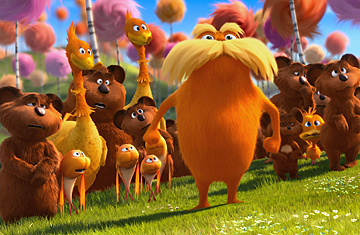
Here's an innocent 3-D movie for the kids: a 12-year-old boy ventures to a remote wasteland where he hopes to find the last of the magical Truffula Trees. The Lorax, from the animation studio that made Despicable Me, is based on the 1971 book by Theodor Geisel, a.k.a. Dr. Seuss, whose rhyming fables have delighted several generations of children and inspired the classic TV specials (and more-recent hit movies) How the Grinch Stole Christmas and Horton Hears a Who! Sweetest of all, The Lorax opens on March 2, the 108th anniversary of Geisel's birth.
Not so fast, naive parents. In a prickly political environment that finds coded subversion in halftime Super Bowl commercials, a literally tree-hugging tale like The Lorax is bound to get up some commentator's nose. "Hollywood is once again trying to indoctrinate our children," thundered Lou Dobbs on the Fox Business Network. One of Dobbs' guests, radio spieler Matt Patrick, accused The Lorax of "creating Occu-toddlers" and urged parents going to the movie to fight back: "Buy, like, huge tubs of popcorn ... Then you crinkle it all up, you throw it on the floor, and you walk out ... You fight back against this message." Yes, a grand idea: Give money to the company that produced The Lorax and the multiplex chains that sell junk food, then let the underpaid theater attendants clean up your mess.
Geisel, we're guessing, would be pleased by the ruckus. From his days editing the Dartmouth humor magazine Jack-O-Lantern, which he said was written "only for the extreme left wing of college student, for the man of social perversity," through his prewar tenure at the Manhattan newspaper PM, where he drew ostrich cartoons of the isolationist Charles Lindbergh, Geisel was a staunch liberal, never shying from a righteous fight. In the Army, he scripted the Private SNAFU animated shorts, sassy instructional satires depicting a lazy GI who does everything wrong. After the war, he and his wife Helen Palmer wrote Design for Death, an Oscar-winning documentary about Japan's military culture.
The Seuss books, with their compact vocabularies, impish illustrations, anapestic rhymed wit and age-spanning wonder, were meant to educate and enchant preschoolers, not turn them into baby pinkos. But Geisel occasionally infused social undertones into his tales. The Butter Battle Book, in 1984, alerted wee ones to the Cold War's nuclear stockpiles. While The Lorax had a gentler tone--it didn't fulminate; it fretted--the story painted a harsh landscape of sylvan nature ravaged by industrial greed. Dobbs might call it Greenpeace for kids.
